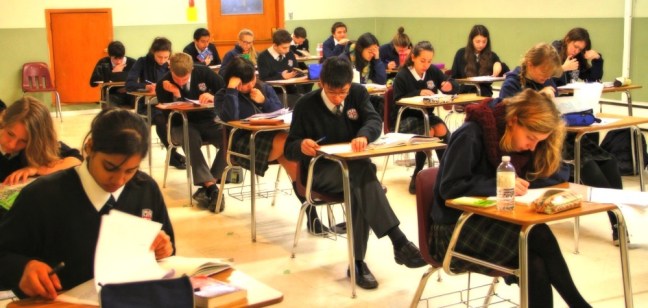Yerin Lee, South Korea
Are you a high school student? How long have you studied in one day? If your answer is over 15 hours, you might be an Asian.

Nowadays, in South Korea, there is one TV series that talks about the educational fervor, named ‘Sky castle’. It describes Korea’s excessive education in reality. In the series, students are like racehorses. They just study to be accepted into the top universities, even if it’s not their aspiration. It’s not only a problem for Korea. Many Asian countries, such as China, Shanghai, Hong Kong and India also have excessive pressure of education. Their high school curriculum is the same as US college freshman or sophomore courses and there are less extra curriculum activities than US high schools. This rigid system is because they have examination-oriented education. In many Asian countries, they just focus on the result of grade, not on the process. Also, these countries have university focused social values, which means almost everyone, including companies evaluates candidates based on the fame of their universities.

For these reasons, students have to enter the top universities, so they have to study hard and compete with others who are their friends. In addition, they are under the pressure of parents who really value their success based on entering a famous university. In these environments, if they don’t have the self- will to study, this pressured situation must be difficult to endure.
Recently, the Department of Education tried to introduce an evaluation system which is not focused on grades. This system evaluates students’ achievement through participation. They require work which is not academic, but more practical, for example, composing music with a group or creating a virtual country themselves. However, despite the government’s intentions, most parents offer private after school lessons to their children to do these extra activities more easily. Therefore, even these new evaluation systems become competitive.

This phenomenon called ‘credentialism in education’ triggers students’ depression or even worse their suicide. In reality, in the countries referred to before, especially India, there are several cases of student suicide. It is a serious problem but is becoming more serious rather than less. To prevent this problem, students’ parents have to pay attention to their children and governments have to develop more effective evaluation systems. Also, companies have to evaluate their applicant not only by the level of education, but also by a candidate’s capacity and abilities.


 Rosalia Vila Tobella, known as Rosalia, is a singer and songwriter from Spain. She was born in Sant Esteve Sesrovires, Catalonia and is 25 years old. She is well known in Spain for her number 9 studio album “Los
Rosalia Vila Tobella, known as Rosalia, is a singer and songwriter from Spain. She was born in Sant Esteve Sesrovires, Catalonia and is 25 years old. She is well known in Spain for her number 9 studio album “Los
 “For me flamenco is the most honest and visceral music that exists. That’s why it captured me… You have to implicate yourself in it, if not it doesn’t work.” (Rosalia, 2018 Billboard)
“For me flamenco is the most honest and visceral music that exists. That’s why it captured me… You have to implicate yourself in it, if not it doesn’t work.” (Rosalia, 2018 Billboard)



















